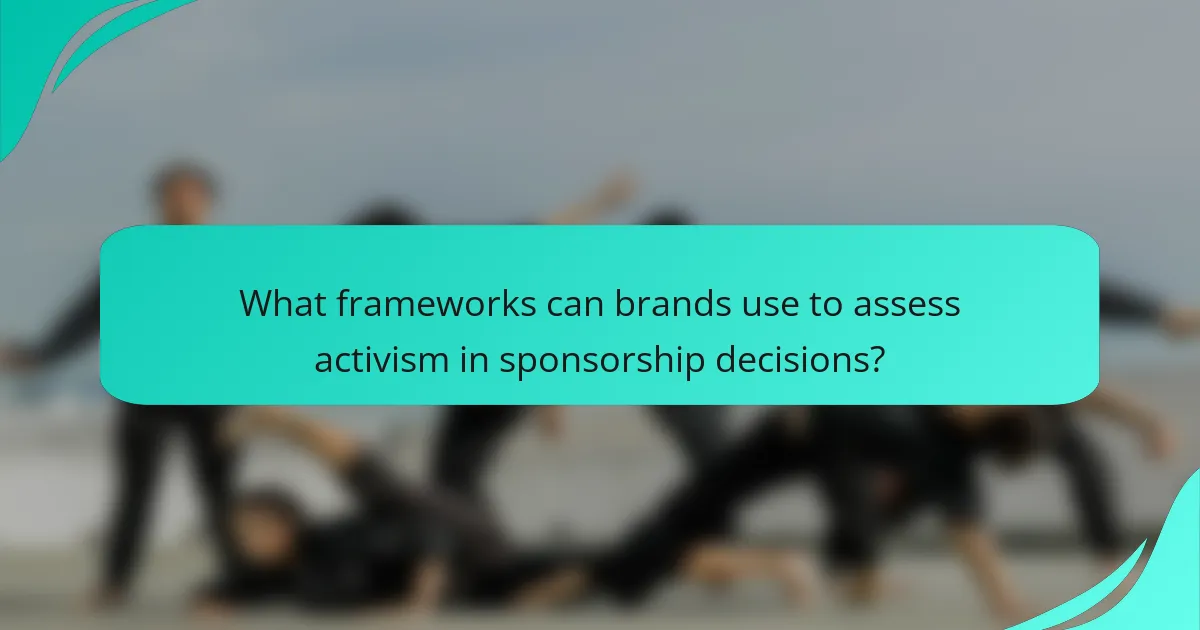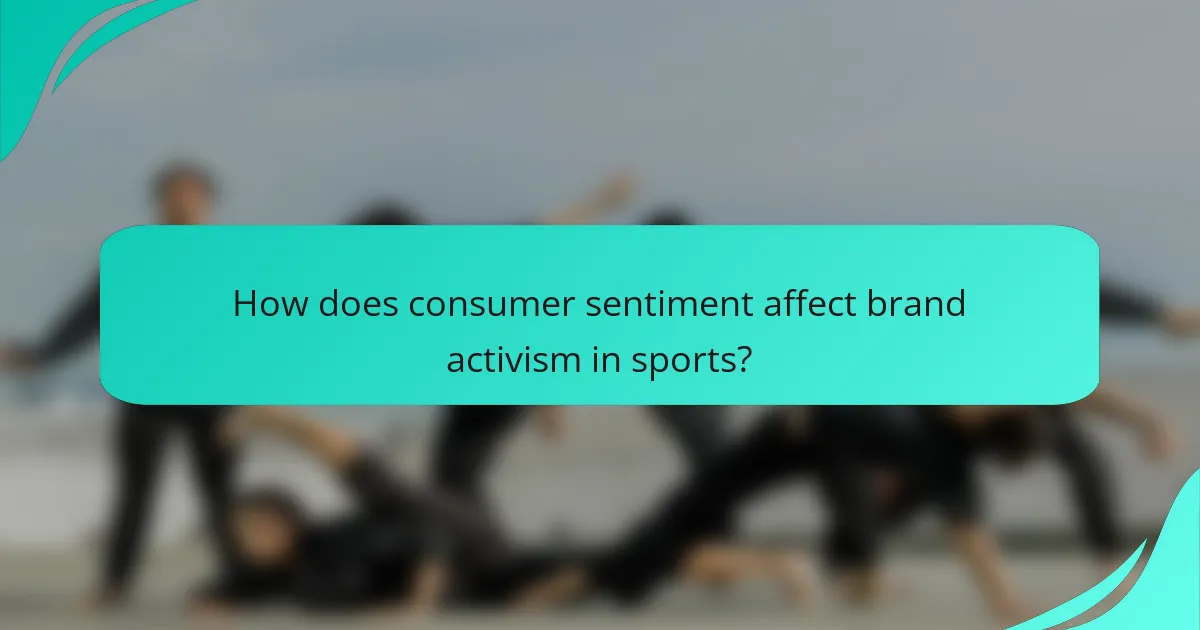Brand activism plays a crucial role in shaping athletic sponsorship decisions by aligning companies with social causes that resonate with consumers. As brands increasingly support social justice movements and environmental sustainability, their sponsorship strategies evolve to reflect these values, ultimately enhancing brand loyalty and influencing public perception.

How does brand activism influence athletic sponsorship decisions?
Brand activism significantly impacts athletic sponsorship decisions by aligning brands with social causes, which can enhance their appeal to consumers. Companies that actively support social issues often see a shift in sponsorship strategies to favor partnerships that resonate with their values and target audience.
Increased consumer loyalty
When brands engage in activism, they often cultivate stronger emotional connections with consumers, leading to increased loyalty. For instance, a sports brand that champions sustainability may attract environmentally conscious athletes and fans, resulting in a dedicated customer base.
To foster loyalty, brands should ensure their activism aligns with their core values and the interests of their audience. This alignment can be achieved through targeted campaigns that resonate with specific demographics, enhancing the likelihood of repeat purchases and brand advocacy.
Enhanced brand reputation
Brand activism can significantly enhance a company’s reputation, particularly when it addresses relevant social issues. A positive public perception can lead to increased visibility and trust, which are crucial in competitive markets like sports sponsorship.
Brands should be cautious, however, as insincere or poorly executed activism can backfire. Authenticity is key; brands must demonstrate genuine commitment through consistent actions rather than one-off campaigns. Engaging with community initiatives or supporting athletes who embody these values can strengthen reputation further.

What are the key factors driving brand activism in sports?
Brand activism in sports is primarily driven by social justice movements and environmental sustainability efforts. These factors influence how brands align with athletes and teams, shaping sponsorship decisions and public perception.
Social justice movements
Social justice movements play a significant role in brand activism, as they highlight issues like racial equality, gender rights, and [censured] representation. Brands increasingly support these causes to resonate with socially conscious consumers, particularly younger demographics.
For instance, companies may choose to sponsor athletes who advocate for social change, thereby enhancing their brand image and loyalty among fans. However, brands must ensure their activism is authentic and not merely performative, as consumers can quickly identify insincerity.
Environmental sustainability
Environmental sustainability is another critical factor driving brand activism in sports. Brands are increasingly adopting eco-friendly practices and supporting initiatives that promote sustainability, such as reducing plastic waste and carbon footprints.
For example, partnerships with organizations focused on environmental conservation can enhance a brand’s reputation. Brands should consider integrating sustainable practices into their operations, such as using recycled materials in merchandise or supporting green events, to align with consumer values and expectations.

Which brands are leading in athletic sponsorship activism?
Nike and Adidas are at the forefront of athletic sponsorship activism, using their platforms to advocate for social justice and sustainability. Their initiatives not only enhance brand loyalty but also influence consumer perceptions and purchasing decisions.
Nike’s social justice campaigns
Nike has made significant strides in social justice activism, particularly through campaigns that address racial inequality and police brutality. Their “Just Do It” campaign featuring Colin Kaepernick sparked widespread discussion and positioned the brand as a leader in advocating for change.
These campaigns often resonate with younger consumers who prioritize social responsibility. Nike’s approach includes collaborations with grassroots organizations and funding initiatives that support marginalized communities, which enhances their brand image and strengthens consumer loyalty.
Adidas’ sustainability initiatives
Adidas focuses on sustainability as a core aspect of its brand activism, implementing eco-friendly practices in its production processes. The company has committed to using recycled materials in many of its products, aiming to reduce plastic waste and promote environmental awareness.
By partnering with organizations like Parley for the Oceans, Adidas not only addresses environmental issues but also appeals to environmentally conscious consumers. Their initiatives include transparent reporting on sustainability goals, which helps build trust and encourages consumer engagement with the brand.

How do athletes impact brand activism in sponsorships?
Athletes significantly influence brand activism in sponsorships by aligning their personal values with the brands they endorse. This alignment can enhance brand credibility and resonate with consumers who share similar beliefs, ultimately affecting purchasing decisions.
Influence of athlete endorsements
Athlete endorsements can elevate a brand’s image, especially when the athlete is seen as a role model or advocate for social causes. Brands that partner with athletes known for their activism can attract consumers who prioritize ethical considerations in their purchasing choices.
For example, a sportswear brand collaborating with an athlete who champions environmental sustainability may appeal to eco-conscious consumers. This synergy can lead to increased brand loyalty and sales, particularly among younger demographics who value corporate responsibility.
Social media presence of athletes
The social media presence of athletes plays a crucial role in amplifying brand activism. Athletes with large followings can quickly spread messages related to social issues, making their endorsements more impactful. Brands benefit from this reach as athletes share their personal stories and advocacy efforts with millions of followers.
For instance, an athlete using platforms like Instagram or Twitter to discuss social justice can enhance the visibility of the brand they represent. Brands should consider the athlete’s engagement levels and authenticity, as genuine interactions can lead to higher consumer trust and brand affinity.

What are the risks associated with brand activism in sports sponsorship?
Brand activism in sports sponsorship carries risks such as consumer backlash and the potential alienation of traditional audiences. Companies must carefully navigate these challenges to maintain their brand integrity while supporting social causes.
Potential backlash from consumers
When brands take a stand on social issues, they may face backlash from consumers who disagree with their stance. This can manifest as negative social media reactions, boycotts, or a decline in sales. Brands should assess their audience’s values and be prepared for mixed reactions.
For example, a sports brand promoting environmental sustainability may alienate consumers who prioritize performance over eco-friendliness. To mitigate backlash, brands can engage in open dialogue with their audience and clarify their intentions behind activism.
Alienation of traditional audiences
Brand activism can alienate traditional audiences who may feel that a brand is straying from its core values. This is particularly relevant in sports, where loyalty to teams and athletes is often tied to long-standing traditions. Brands must balance activism with the expectations of their existing fan base.
For instance, a brand that has historically focused on performance may lose support if it suddenly shifts to a strong political stance. To avoid alienation, brands should gradually introduce their activism and ensure it aligns with their overall mission and values.

What frameworks can brands use to assess activism in sponsorship decisions?
Brands can utilize various frameworks to evaluate the role of activism in their sponsorship choices. These frameworks help determine how well a brand’s values align with those of potential partners and the broader societal impact of their sponsorships.
Stakeholder analysis
Stakeholder analysis involves identifying and understanding the interests and influences of all parties affected by a brand’s sponsorship decisions. This includes athletes, fans, community groups, and investors. Brands should assess how these stakeholders perceive activism and what values they prioritize.
To conduct a stakeholder analysis, brands can create a matrix that categorizes stakeholders based on their level of influence and interest. This helps in prioritizing engagement strategies and understanding potential backlash or support for activist initiatives.
Impact assessment models
Impact assessment models evaluate the potential social, economic, and environmental effects of sponsorship decisions. Brands can use qualitative and quantitative metrics to measure these impacts, such as brand reputation, customer loyalty, and community engagement. A common approach is to employ frameworks like Social Return on Investment (SROI) to quantify benefits against costs.
Brands should consider both short-term and long-term impacts when assessing activism in sponsorships. For example, a sponsorship aligned with social justice may initially incur costs but could lead to enhanced brand loyalty and market share over time. Regularly reviewing these models can help brands adapt their strategies to changing societal expectations.

How does consumer sentiment affect brand activism in sports?
Consumer sentiment significantly influences brand activism in sports by shaping how companies align their sponsorship decisions with social issues. Brands are increasingly aware that aligning with causes that resonate with their audience can enhance loyalty and drive engagement.
Shifts in public opinion
Public opinion can shift rapidly, often influenced by social movements, media coverage, and cultural events. Brands that fail to adapt to these changes may face backlash, while those that respond positively can strengthen their market position. For instance, a sports brand that supports environmental sustainability may gain favor among eco-conscious consumers.
Monitoring social media trends and public discourse is essential for brands to remain relevant. Engaging with consumers through surveys or feedback can provide insights into shifting sentiments, allowing brands to adjust their activism strategies accordingly.
Consumer expectations for corporate responsibility
Consumers today expect brands to take a stand on social issues, particularly in the sports industry. This expectation can drive companies to engage in activism, reflecting their values and commitment to corporate social responsibility. Brands that demonstrate genuine support for causes often see increased consumer trust and loyalty.
To meet these expectations, brands should develop clear policies and initiatives that align with their core values. Transparency in their efforts and the impact of their activism is crucial; consumers are more likely to support brands that openly communicate their goals and progress. Regularly updating stakeholders on initiatives can enhance credibility and foster a deeper connection with the audience.

What emerging trends are shaping brand activism in athletic sponsorship?
Brand activism in athletic sponsorship is increasingly influenced by social movements, consumer expectations, and athlete advocacy. Companies are aligning their sponsorship strategies with social causes that resonate with their target audiences, leading to more meaningful partnerships.
Increased focus on social justice issues
Brands are prioritizing social justice in their sponsorship decisions, responding to consumer demand for corporate responsibility. This trend is evident as companies support initiatives related to racial equality, gender rights, and environmental sustainability. For example, brands may choose to sponsor athletes or events that actively promote these causes.
To effectively engage in social justice, brands should ensure their messaging aligns with their actions. Authenticity is crucial; consumers can quickly identify insincerity, which can damage brand reputation. Companies should consider partnerships with organizations that have a proven track record in social advocacy.
Consumer expectations for transparency
Consumers are increasingly expecting brands to be transparent about their values and practices, particularly in athletic sponsorship. This trend requires companies to openly communicate their commitments to social issues and the impact of their sponsorships. Transparency can enhance brand loyalty and trust among consumers.
Brands should provide clear information about their sponsorship choices and the social causes they support. Regular updates through social media and corporate reports can help maintain consumer engagement. Avoiding vague statements and instead offering concrete examples of impact can strengthen consumer trust.
Rise of athlete activism
Athlete activism is becoming a significant factor in brand sponsorship decisions. Athletes are using their platforms to advocate for various social issues, influencing brand partnerships. Companies are now more likely to align with athletes whose values reflect their own, creating a more cohesive brand image.
Brands should consider the personal beliefs and public actions of athletes when forming sponsorships. Engaging with athletes who actively support social causes can enhance brand credibility. However, brands must be prepared for potential backlash if an athlete’s activism does not align with consumer sentiment.
